A Nobel Peace Prize for Internet? It's About Time!
Who will be the next Nobel Peace Prize? In 2009 the President of the United States Barack Obama was awarded this recognition for the "extraordinary efforts to strengthen international diplomacy and cooperation between peoples." Last November Wired Italia Magazine, in the person of his Editor in Chief Riccardo Luna, launched the proposal that this year the Prize will be given to Internet. The manifesto of the Internet for Peace Project, that was first presented in Milan, was inspired by a recent assertion by Italian scientist Rita Levi Montalcini who, on the eve of her 100th birthday, said that “Internet is the most important invention of the last century”, underlining how it strongly affected and shaped our relationship with the outside world, and our approach to “diversity”
Well welcomed in Italy, with about 160 Parliament representatives signing the mission statement of the Project, the international success of Internet for Peace was celebrated on September 21 at the Paley Center for Media in New York at the presence of the Consul General of Italy Francesco Maria Talò, and Riccardo Viale, director of the Italian Cultural Institute of New York, one of the main sponsors of the event.
“We are here to celebrate the great outcome of our initiative, that is backed by over 200 countries worldwide. This is already a victory to us, whatever will be the final decision of the Nobel jury”, said Mr. Luna before the screening of a collection of supportive videos produced for the official YouTube channel of the Project by people of every race, color, and lineage.
The Nobel Prize for Peace has traditionally been awarded to personalities that are now part of our contemporary history such as Theodore Roosevelt (1906); Martin Luther King (1964) or Michail Sergeevič Gorbačëv (1990). After more than 40 years from its invention, Mr. Luna thinks that time has come for Internet to be awarded as well, “because its contribution to peace should be taken in strong consideration. It is a weapon of mass construction”. Given that it is the favorite mean of communication of new and future generations, in fact, it allows people from every corner of the world to talk, confront, and understand each other better. “Communication leads to dialogue, and dialogue ultimately leads to peace”, he continued.
The ceremony was enriched by the presence of two of the three ambassadors of the project: the 2003 Nobel Peace Prize Shirin Ebadi, an Iranian lawyer, former judge and human rights activist, founder of the Centre for the Defence of Human Rights in Iran; and Nicholas Negroponte, founder and Chairman Emeritus of the Massachusetts Institute of Technology's Media Lab, first inventor of Wired Magazine, and founder of the One Laptop per Child Association (OLPC), a US non-for-profit organization whose purpose is “to stimulate local grassroots initiatives designed to enhance and sustain over time the effectiveness of laptops as learning tools for children living in lesser-developed countries,” as written in its mission statement.
Mrs. Ebadi underlined how Internet has been a great help to her country after the the 2009 elections, when people rebelled against the falsification of the results and four journalists were arrested. Demontrators were killed, injured, arrested. On that occasion “ordinary” people used their cell phones and other wireless devices to post videos and pictures on the web so that all the world knew what was going on. “Fifteen years before nobody would have known about those killings and tortures. Internet can be a menace to government oppression”.
Nicholas Negroponte took his time on stage to praise the educational merits of Internet as a mean for peace. His One Laptop per Child Association distributes low-cost, low-power, connected XO laptops featuring contents and software designed for collaborative, joyful, self-empowered learning to children of less-advantaged countries. “Where does peace come from? Peace comes from understanding, which itself comes from education and from the possibility to share your point of view with others. Internet means eliminating distances: it is a window that has by now reached over 2 million of children in poor countries putting an end to their isolation, and thus to the lack of dialogue”.
The third ambassador of the campaign, the Cuban blogger Yoani Sanchez, could not attend the ceremony because she was not given the permission to leave her country to come to the US on time for the ceremony. In a letter she sent us for the occasion, however, she explained the reasons why she accepted to become a testimonial of Internet for Peace: “The world has become a brotherly place now that someone in Mubai can chat and exchange experiences with someone in Buenos Aires. Thanks to the existence of cyberspace, censors are finding it ever more difficult to limit freedom of expression. The Internet consequently serves as a loudspeaker for those whose voices are least heard, and as a hammer breaking down the wall of control for those who live their lives surrounded by authoritarianism and intolerance”.
This was the second time this year that Yoani Sanchez was denied the permission to leave Cuba: the first was at the beginning of the year when she had to travel to Vienna to receive her World Press Freedom Hero Award in Vienna.
The director of the Italian Cultural Institute Riccardo Viale warned the public about the risks of an incorrect use of Internet: “we must avoid its balkanization, the creation of many different InternetS - web platforms that do not inter-communicate - and we must make so that institutions and governments can not exercise their power and control over it. Internet must remain an opened space, a common place where people can communicate with no borders.”
Finally Mr. Luna introduced us to the winner of Wired Italy’s Internet for Peace Competition, the Korean group Miyoomo represented by its executive director Sean Kim. The video, featuring the hunting melody “The best Tool for Peace” was selected among other 600 videos that were sent to the official YouTube Channel of the magazine. The video is a documentary based on a peace project that was centered on the 2010 World Cup period this past summer. By use of the Internet, the Myoomo group was able to complete this project within three weeks, in collaboration with volunteers from America, South Korea, Qatar, and China. “Our common goal for global peace is what connected us idealistically, but the Internet was the pathway from which our ideas could be connected physically,” said Mr. Kim.
We still don’t know whether Internet will win this year’s Nobel Peace Prize, but the great support the idea has had at both an institutional and social level is already a great victory for its promoters. Just to mention a few figures, more than 14,500,000 viewers have visited Wired’s Youtube Channel in this time period; 20,000 tweets have been exchanged about the Nobel for Peace Internet candidacy, and results in Google with the keywords “Internet for peace” are listed in several millions of pages.
“Since my second child Ferdinando was born just a few days later we presented the manifesto of our project in Milan, I want to dedicate this important achievement we feel we have accomplished to all the children of the world: we are working for them, for a peaceful future. And that passes through Internet,” concluded Mr. Luna.
Showing all our support to the project, we’ll be waiting for December 10-11 finger crossed, hoping to see him and the other promoters of the Internet for Peace Project attending the official Nobel Ceremony in Oslo.






























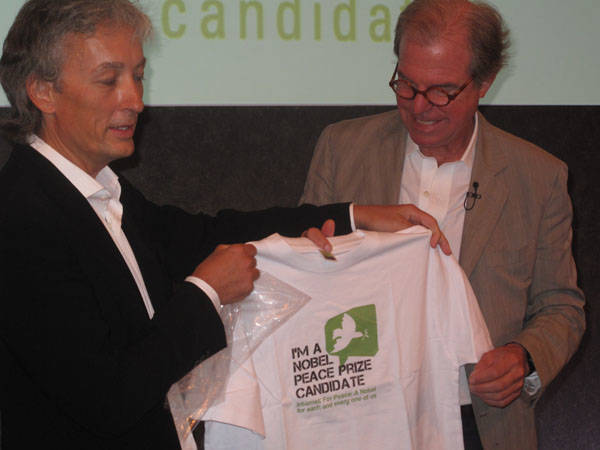

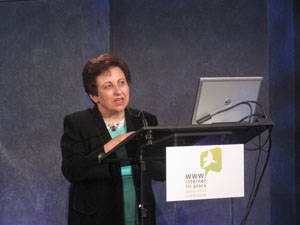
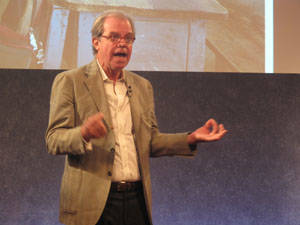
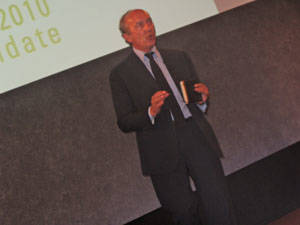
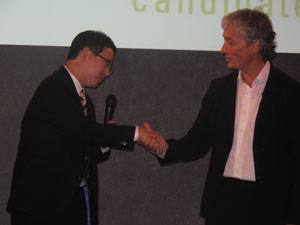
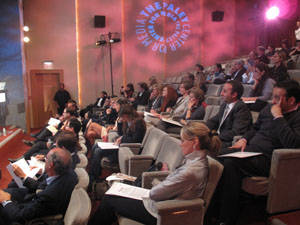
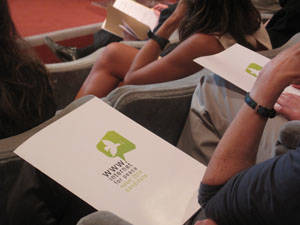







i-Italy
Facebook
Google+
This work may not be reproduced, in whole or in part, without prior written permission.
Questo lavoro non può essere riprodotto, in tutto o in parte, senza permesso scritto.